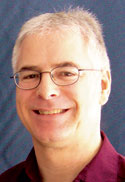One of the things that I enjoy most about winter is that it’s curling season. Each Monday morning I join our local clergy curling club for some spirited fun on the ice.
Curling is a great sport. All that vigorous sweeping helps me to stay physically fit, and the “chess on ice” aspect of the game keeps my mind sharp. As curlers, we are constantly “reading the ice” as we try to figure out how much curl it has, how fast it is today, and where the spots are that the ice is “running straight” or is simply cantankerous and unpredictable.
Good curlers need to be attuned to the environment on their particular sheet of ice. In order to play the game well, we must figure out “what is going on out there.” Without that, our best efforts are for naught and our best shot-making will be woefully inadequate.
On top of all that, there is the constant decision-making. Curling is a tactical sport and requires some strategic thinking in order to execute a good game plan. This is normally the job of the skip, who is “in charge of the house” and is responsible for calling the shots that each player contributes to the overall team effort.
When I returned home this morning and plopped down my curling bag in the front hallway after a hard-fought game, a disturbing thought went through my mind. When it comes to the church, who’s in charge of the house of God? Who’s calling the shots?
My observation is that many churches are executing great “shot-making,” but there is no skip at the helm who is directing the play. Churches can produce a wealth of worship, caregiving, service, sacrifice and hard work, but is there any overall focus or strategy to all that activity? Is anyone out there “reading the ice” and asking what is happening in the social context in which we minister and how God is calling us to respond?
A deep concern of mine is that we take the best leaders in our churches and then ask them to make decisions about fixing the boiler and how much to spend on carpet and new paint. In fact, there are days that I wonder if we, as Mennonites, have a deep-seated fear of having anyone “in charge of the house.”
I wonder what would happen if congregations invited their councils and pastors to start skipping the game plan for their church? Skips can sometimes be autocratic, but good skips are quite democratic and actively seek the input of other players at key points in the game. Having someone in charge of calling the game can still include the many voices of the congregation.
Here’s an idea. Why not send your pastor and church council down to the local curling rink to observe a game or two? Better yet, maybe they should take up curling!
David Martin is executive minister of Mennonite Church Eastern Canada.








Leave a Reply
You must be logged in to post a comment.